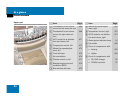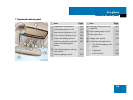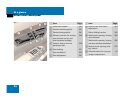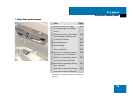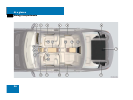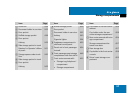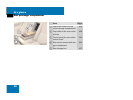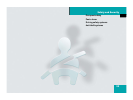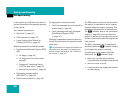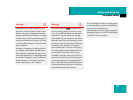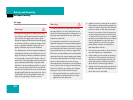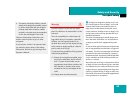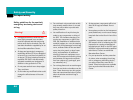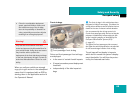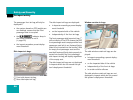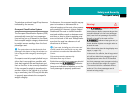
40
Safety and Security
Occupant safety
In this section you will learn the most im-
portant facts about the restraint systems
of the vehicle.
The restraint systems are
ț Seat belts (୴ page 52)
ț Child restraints (୴ page 57)
ț Lower Anchors and Tethers for
CHildren (LATCH) (
୴ page 62)
Additional protection potential provide
ț Supplemental Restraint System (SRS)
with
ț Air bags (୴ page 42)
ț Air bag control unit (with crash
sensors)
ț Emergency Tensioning Device
(ETD) for seat belts (
୴ page 55)
ț Seat belt force limiter (୴ page 55)
ț Preventive occupant safety
(PRE-SAFE
®
) (୴ page 56)
ț Active head restraints (୴ page 55)
Air bag system components with
ț The front passenger front air bag off in-
dicator lamp (
୴ page 50)
ț Front passenger seat with Occupant
Classification System (OCS)
(
୴ page 47)
Although independent systems, their pro-
tective functions work in conjunction with
each other.
The SRS system conducts a self-test when
the ignition is switched on and in regular
intervals while the engine is running. This
facilitates early detection of malfunctions.
The = indicator lamp in the instrument
cluster (
୴ page 28) comes on when the
ignition is switched on and goes out no lat-
er than a few seconds after the engine has
been started.
The SRS components are in operational
readiness when the = indicator lamp is
not lit when the engine is running.
A malfunction in the system has been
detected if the = indicator lamp:
ț fails to go out after approximately
4 seconds after the engine was started
ț does not come on at all
ț comes on after the engine was started
or while driving
i
For information on infants and children trav-
eling with you in the vehicle and restraint sys-
tems for infants and children, see “Children in
the vehicle” (
୴ page 57).



